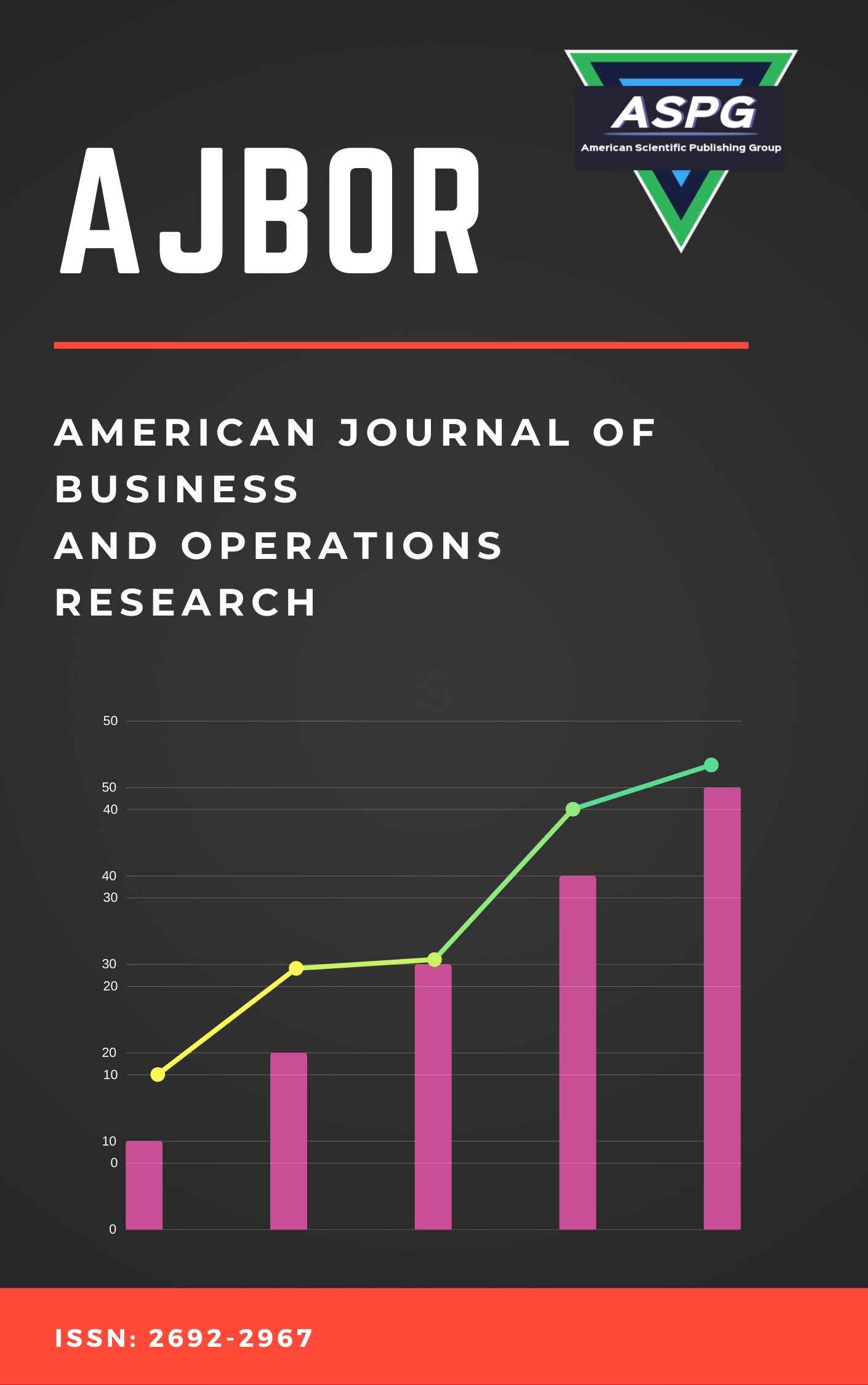

Volume 2 , Issue 1 , PP: 65-72, 2021 | Cite this article as | XML | Html | PDF | Full Length Article
Alshaimaa A. Tantawy 1 * , Heba R. Abdelhady 2 , Shereen Zaki 3 , Mahmoud M. Ismail 4
Doi: https://doi.org/10.54216/AJBOR.020105
In today's highly competitive business environment, companies are increasingly focusing on enhancing customer satisfaction to improve customer loyalty and drive business growth. In this context, the use of data-driven approaches can provide valuable insights for companies to improve their service quality and customer experience. This paper presents a case study in service operations management, where a data-driven approach is used to enhance customer satisfaction. We employ a dataset of customer feedback from a service company and proposes a deep learning (DL) algorithm learn to identify the factors that affect customer satisfaction. The results show that the proposed data-driven approach is effective in identifying the key drivers of customer satisfaction and in providing actionable insights for service improvement. We highlight the potential of our DL approach for enhancing customer satisfaction and provides insights for service companies to improve their customer experience based on the analysis of customer feedback.
Customer Satisfaction , Data Analysis , Operations Management , Customer Service
[1] Kumar, S. and Zymbler, M., 2019. A machine learning approach to analyze customer satisfaction from airline tweets. Journal of Big Data, 6(1), pp.1-16.
[2] Wei, Q., Shi, X., Li, Q. and Chen, G., 2020. Enhancing customer satisfaction analysis with a machine learning approach: From a perspective of matching customer comment and agent note.
[3] Wong, A.N. and Marikannan, B.P., 2020, December. Optimising e-commerce customer satisfaction with machine learning. In Journal of physics: Conference series (Vol. 1712, No. 1, p. 012044). IOP Publishing.
[4] Hwang, S., Kim, J., Park, E. and Kwon, S.J., 2020. Who will be your next customer: A machine learning approach to customer return visits in airline services. Journal of Business Research, 121, pp.121-126.
[5] Nilashi, M., Mardani, A., Liao, H., Ahmadi, H., Manaf, A.A. and Almukadi, W., 2019. A hybrid method with TOPSIS and machine learning techniques for sustainable development of green hotels considering online reviews. Sustainability, 11(21), p.6013.
[6] Zhou, F., Ayoub, J., Xu, Q. and Jessie Yang, X., 2020. A machine learning approach to customer needs analysis for product ecosystems. Journal of mechanical design, 142(1).
[7] Dullaghan, C. and Rozaki, E., 2017. Integration of machine learning techniques to evaluate dynamic customer segmentation analysis for mobile customers. arXiv preprint arXiv:1702.02215.
[8] Hasan, T., Matin, A. and Joy, M.S.R., 2020, December. Machine Learning Based Automatic Classification of Customer Sentiment. In 2020 23rd International Conference on Computer and Information Technology (ICCIT) (pp. 1-6). IEEE.
[9] Sánchez-Franco, M.J., Navarro-García, A. and Rondán-Cataluña, F.J., 2019. A naive Bayes strategy for classifying customer satisfaction: A study based on online reviews of hospitality services. Journal of Business Research, 101, pp.499-506.
[10] Sabbeh, S.F., 2018. Machine-learning techniques for customer retention: A comparative study. International Journal of advanced computer Science and applications, 9(2).
[11] Chumwatana, T., 2015. Using sentiment analysis technique for analyzing Thai customer satisfaction from social media.
[12] Vermeer, S.A., Araujo, T., Bernritter, S.F. and van Noort, G., 2019. Seeing the wood for the trees: How machine learning can help firms in identifying relevant electronic word-of-mouth in social media. International Journal of Research in Marketing, 36(3), pp.492-508.
[13] Al-Otaibi, S., Alnassar, A., Alshahrani, A., Al-Mubarak, A., Albugami, S., Almutiri, N. and Albugami, A., 2018. Customer satisfaction measurement using sentiment analysis. International Journal of Advanced Computer Science and Applications, 9(2).
[14] Aluri, A., Price, B.S. and McIntyre, N.H., 2019. Using machine learning to cocreate value through dynamic customer engagement in a brand loyalty program. Journal of Hospitality & Tourism Research, 43(1), pp.78-100.
[15] Usharani, S., Jayakumar, D., Palani, D.U., Raghuraman, D., Parthiban, R., Saravanan, D. and David, D.D.S., 2020. Industrialized service innovation platform based on 5g network and machine learning. European Journal of Molecular & Clinical Medicine, 7(11), pp.5684-5703.
[16] Lucini, F.R., Tonetto, L.M., Fogliatto, F.S. and Anzanello, M.J., 2020. Text mining approach to explore dimensions of airline customer satisfaction using online customer reviews. Journal of Air Transport Management, 83, p.101760.
[17] Lee, I. and Shin, Y.J., 2020. Machine learning for enterprises: Applications, algorithm selection, and challenges. Business Horizons, 63(2), pp.157-170.
[18] Paramesh, S.P. and Shreedhara, K.S., 2019. Automated IT service desk systems using machine learning techniques. In Data Analytics and Learning: Proceedings of DAL 2018 (pp. 331-346). Springer Singapore.
[19] Roy, R. and George, K.T., 2017, April. Detecting insurance claims fraud using machine learning techniques. In 2017 international conference on circuit, power and computing technologies (ICCPCT) (pp. 1-6). IEEE.
[20] Tarallo, E., Akabane, G.K., Shimabukuro, C.I., Mello, J. and Amancio, D., 2019. Machine learning in predicting demand for fast-moving consumer goods: An exploratory research. IFAC-PapersOnLine, 52(13), pp.737-742.
[21] Farhadloo, M., Patterson, R.A. and Rolland, E., 2016. Modeling customer satisfaction from unstructured data using a Bayesian approach. Decision Support Systems, 90, pp.1-11.
[22] Dang, Y., Lin, Q. and Huang, P., 2019, May. Aiops: real-world challenges and research innovations. In 2019 IEEE/ACM 41st International Conference on Software Engineering: Companion Proceedings (ICSE Companion) (pp. 4-5). IEEE.
[23] Khodabandehlou, S. and Zivari Rahman, M., 2017. Comparison of supervised machine learning techniques for customer churn prediction based on analysis of customer behavior. Journal of Systems and Information Technology, 19(1/2), pp.65-93.
[24] Monil, P., Darshan, P., Jecky, R., Vimarsh, C. and Bhatt, B.R., 2020. Customer Segmentation Using Machine Learning. International Journal for Research in Applied Science and Engineering Technology (IJRASET), 8(6), pp.2104-2108.
[25] Najadat, H., Al-Abdi, A. and Sayaheen, Y., 2018, April. Model-based sentiment analysis of customer satisfaction for the Jordanian telecommunication companies. In 2018 9th International Conference on Information and Communication Systems (ICICS) (pp. 233-237). IEEE.
[26] Al-Mashraie, M., Chung, S.H. and Jeon, H.W., 2020. Customer switching behavior analysis in the telecommunication industry via push-pull-mooring framework: A machine learning approach. Computers & Industrial Engineering, 144, p.106476.